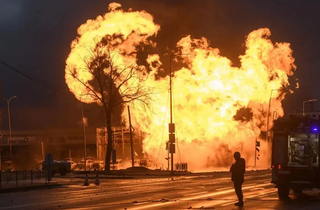The attacks targeted multiple regions across Ukraine, including Kyiv, Kropyvnytskyi, Rivne, Ivano-Frankivsk, Cherkasy, Dnipro, Vinnytsia, Kryvyi Rih, Odesa, Zaporizhzhia, Khmelnytskyi, and Volyn oblasts.
In Kyiv, explosions shook the city between 6:30 and 7:15 a.m., damaging residential and commercial buildings. In the Pechersk neighborhood, an apartment fire broke out after falling debris, leaving one person hospitalized. The Holosiivskyi and Dniprovskyi districts also bore the brunt of the attack, with several structures sustaining heavy damage.
The onslaught was not limited to Kyiv. Across the country, cities and regions faced devastation. Mykolaiv mourned the loss of two lives, including two children, and saw seven others injured. In Dnipro, a railway depot was struck, killing two railway workers and wounding three more, while residential buildings and vehicles were also damaged. Lviv Oblast reported a tragic incident where missile debris ignited fires in garages, claiming the life of a 66-year-old woman.
Odesa, too, faced a grim toll, with two lives lost and a teenager injured. Infrastructure facilities in regions such as Rivne, Poltava, and Zhytomyr were also hit, causing extensive damage and compounding the challenges faced by Ukrainian authorities. The strikes led to emergency power shutdowns in several oblasts, leaving residents in the cold and dark as winter loomed.
Ukraine’s air defenses worked tirelessly, intercepting over 140 aerial threats, including cruise, ballistic, and air-launched missiles. President Volodymyr Zelensky praised the coordinated efforts of pilots, mobile fire units, and electronic warfare teams in mitigating the damage. Despite their success, the scale of the attack, involving roughly 120 missiles and 90 drones, underscored the immense challenge Ukraine continues to face.
The strikes were launched from Russian bombers stationed in Murmansk and Saratov oblasts, revealing the lengths to which Moscow is willing to go to destabilize Ukraine’s infrastructure. Energy Minister Herman Halushchenko warned that the attacks on power generation and transmission facilities were part of a broader strategy to weaken Ukraine’s resilience as temperatures plummet.
Poland, alarmed by the proximity of the attacks, scrambled fighter jets and heightened its air defense readiness, reflecting the regional implications of Russia’s aggression. Meanwhile, the broader conflict remains marked by an escalation in drone warfare. Between August and October 2024, over 4,300 Shahed-type drones were deployed by Russia, overwhelming Ukrainian defenses and compounding the devastation.
As Ukraine grapples with this renewed wave of attacks, the resolve of its people and the effectiveness of its defenses remain critical. The scars of this latest assault will linger, but so too will the resilience that has defined the nation in its darkest hours. (ILKHA)



 Güncel
Güncel
 Dünya
Dünya
 Güncel
Güncel
 Güncel
Güncel
 Güncel
Güncel
 Dünya
Dünya
 Dünya
Dünya
 Dünya
Dünya
 Güncel
Güncel
 Güncel
Güncel





